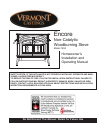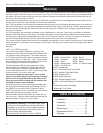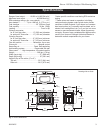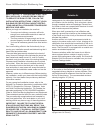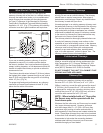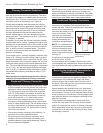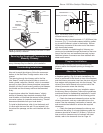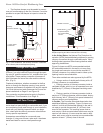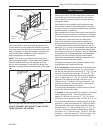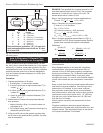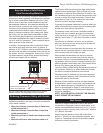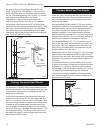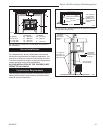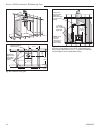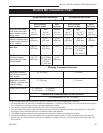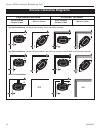
4
Encore 1450 Non-Catalytic Woodburning Stove
30002425
SAFETY NOTICE: IF YOUR ENCORE IS NOT PROP-
ERLY INSTALLED, A HOUSE FIRE MAY RESULT.
TO REDUCE THE RISK OF FIRE, FOLLOW THE
INSTALLATION INSTRUCTIONS. CONTACT LOCAL
BUILDING OR FIRE OFFICIALS ABOUT RESTRIC-
TIONS AND INSTALLATION INSPECTION REQUIRE-
MENTS IN YOUR AREA.
Before you begin an installation, be sure that:
• Your stove and chimney connector will be far
enough from combustible materials to meet all
tested clearance requirements.
• The floor protector is large enough and is con-
structed properly to meet all tested requirements.
• You have all necessary permits from local author-
ities.
Your local building official is the final authority for ap-
proving your installation as safe and determining that it
meets local and state codes.
The metal label permanently attached to the back of
every Vermont Castings’ stove indicates the stove has
been tested and meets current UL and ULC safety
standards, and gives the name of the testing laboratory.
Clearance and installation information also is printed
on the label. When the stove is installed according to
the information both on the label and in this manual,
local authorities in most cases will accept the label as
evidence that the installation meets codes and can be
approved.
However, codes vary in different areas. Before starting
the installation, review your plans with the local building
authority. Your local dealer can provide any additional
information needed.
For any unresolved installation issues, refer to the
National Fire Protection Association’s publication ANSI/
NFPA 211 Standard for Chimneys, Fireplaces, Vents
and Solid Fuel Burning Appliances. For Canada, the
equivalent publication is CSA CAN-B365 Installation
Code for Solid Fuel Burning Appliances and Equipment.
These standards are the basis for many national codes.
They are nationally recognized and are accepted by
most local authorities. Your local dealer or your local
building official may have a copy of these regulations.
IMPORTANT: FAILURE TO FOLLOW THESE IN-
STALLATION INSTRUCTIONS MAY RESULT IN A
DANGEROUS SITUATION, INCLUDING A CHIMNEY
OR HOUSE FIRE. FOLLOW ALL INSTRUCTIONS
EXACTLY, AND DO NOT ALLOW MAKESHIFT COM-
PROMISES TO ENDANGER PROPERTY AND PER-
SONAL SAFETY.
Installation
Outside Air
In some modern, super-insulated homes, there is
inadequate air for combustion because of insufficient
air infiltration into the building. Such air enters a home
through unsealed cracks and openings. Exhaust fans
for kitchen or bath can compete with the stove for avail-
able air and compound the problem.
When poor draft is caused by a low infiltration rate,
opening a ground floor window on the windward side
of the house and in the vicinity of the stove will usually
alleviate the problem.
Another solution is to install a permanent outside air
supply to the stove and/or room. In fact, bringing air for
combustion from outside the home directly to the air in-
let of the stove is required for new construction in some
areas. The Encore NC is equipped with an outside con-
nection as standard equipment.
Pressure variations within the house do not affect a
stove equipped with an outside air supply, and im-
proved stove performance often results. An Outside Air
Adapter Kit for the Encore is available from your local
Vermont Castings dealer.
Chimney Height
Altitude affects chimney performance. When using a
6” flue collar on the Encore NC, refer to Figure 2 for
suggested chimney heights at various altitudes. Chim-
ney height should be measured from the flue collar to
the top of the chimney. The recommended minimum
chimney height is 16’ (4.9 m).
30
25
20
15
0 2000 4000 6000 8000 10000 12000
Height (ft.)
Altitude (ft.)
ST491
Defiant
chimney height
11/2/00 djt
6“
ST491
Fig. 2 Chimney height requirements for Encore when
equipped with a 6” chimney.



